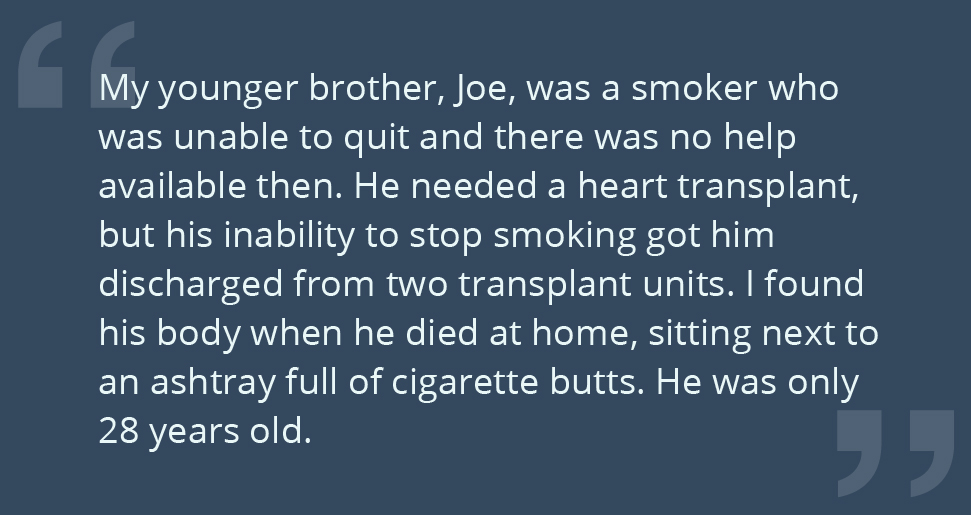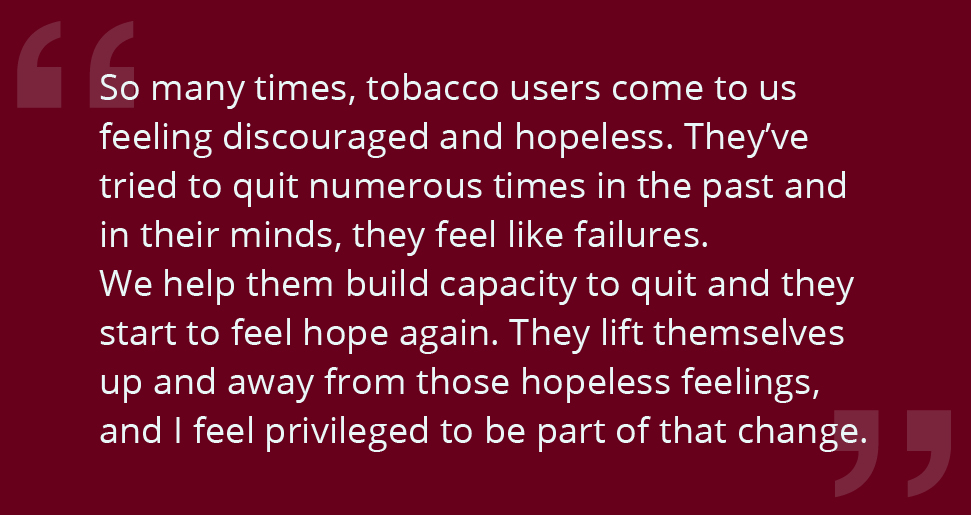At Mayo Clinic, I supervise a program at the Nicotine Dependence Center that treats more than 2,500 patients every year and educates more than 400 health professionals.
I also conduct research efforts into what type of behavioral shifts are most effective for quitting tobacco.
My path getting to this point began when two very different but interrelated events changed my life and the trajectory of my career.
Pivotal events
One was a lecture that fired up my awareness. I was in a counseling psychology program at Rutgers and working as a substance abuse counselor when I heard a talk given by John Slade, one of the experts who testified in Washington when the truth about tobacco’s addictive properties was first uncovered.
He spoke so clearly about the problem that I realized, for the first time, that tobacco was just as much of a killer as cocaine or any other highly addictive substance. In many ways, it’s worse, because it’s killed more people.
At about the same time, the other event was a loss I grieve, but also draw on to help others.
My younger brother, Joe, was a smoker who was unable to quit and there was no help available then. He needed a heart transplant, but his inability to stop smoking got him discharged from two transplant units. I found his body when he died at home, sitting next to an ashtray full of cigarette butts. He was only 28 years old.
Much of what I do is dedicated to his memory. I’ve wondered about what he could have become, what he could have done with his life, if he’d had the support he needed to stop. Counselors then, in the late 1980s, didn’t know how to help people like Joe.
But we do now, and I often see young people who remind me of him—they have families, too, and because of the work we do, those families won’t have to go through that loss. Just as important, a generational cycle can be broken because the children of those tobacco users will be much less likely to start.
Those two events, taken together, led me to specializing in nicotine dependence, and working with John Slade until his passing in 2002. A few years later, I was recruited by Mayo Clinic in Rochester, Minn., to supervise on-site tobacco addiction programs here.
To expand the reach of Mayo Clinic’s proven approach to help tobacco users quit, I’ve been working in collaboration with Truth Initiative and EX since 2008.
Mayo Clinic and EX
The combination of Mayo Clinic and EX is distinctive and valuable.
The EX Program is a digital adaptation of Mayo Clinic’s model and uses best-in-class tools and professional support to help people make a change. This program is also available anytime. That’s exciting, because that approach of the right support at the right time can be a crucial way to break free from tobacco addiction.
I’ve also embraced the opportunity to do research, especially on the efficacy of digital tools, to ensure that their use is based on evidence.
But what I’ll always love most is patient care. This fuels what I do because I see how meaningful and powerful it can be for patients and their families. The work we do is focused on giving people the skills they need to be free from nicotine dependence and lead full, healthy lives.
So many times, tobacco users come to us feeling discouraged and hopeless. They’ve tried to quit numerous times in the past and in their minds, they feel like failures.
We help them build capacity to quit and they start to feel hope again. They lift themselves up and away from those hopeless feelings, and I feel privileged to be part of that change.
To learn more about the powerful collaboration between Mayo Clinic and Truth Initiative—and the people behind the EX Program—I encourage you to visit the About Us page.






